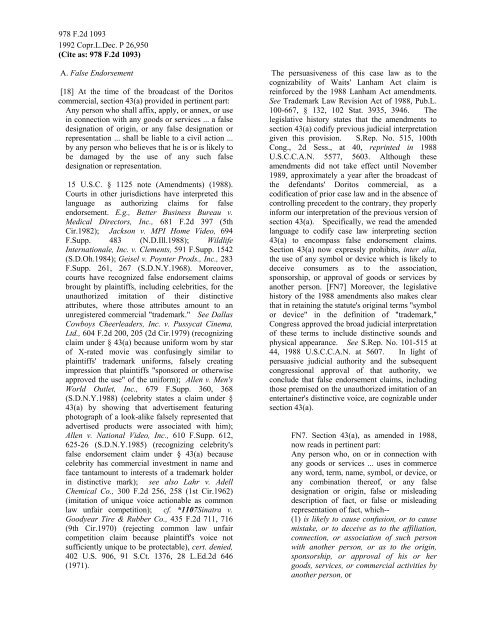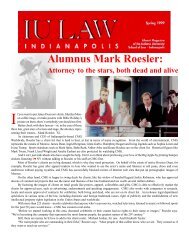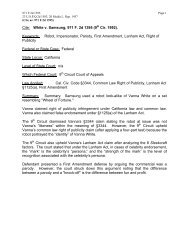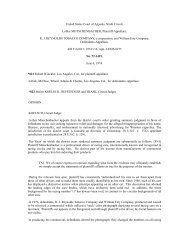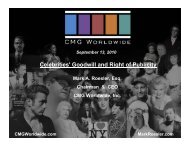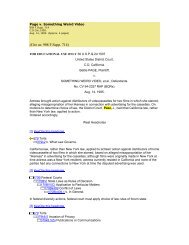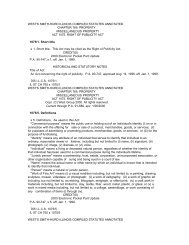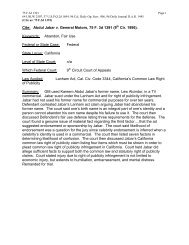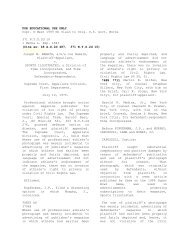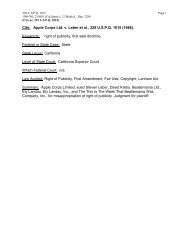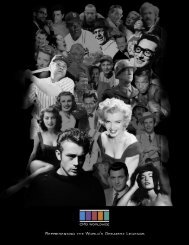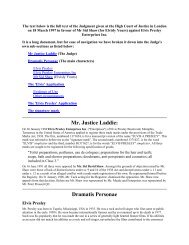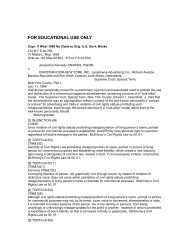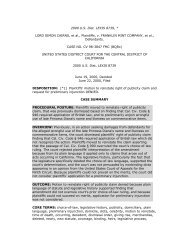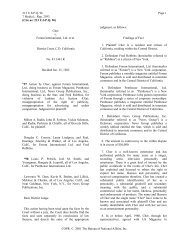Cite: Waits v. Frito Lay, 978 F. 2d 1093 (9th Cir. 1992 ... - Mark Roesler
Cite: Waits v. Frito Lay, 978 F. 2d 1093 (9th Cir. 1992 ... - Mark Roesler
Cite: Waits v. Frito Lay, 978 F. 2d 1093 (9th Cir. 1992 ... - Mark Roesler
You also want an ePaper? Increase the reach of your titles
YUMPU automatically turns print PDFs into web optimized ePapers that Google loves.
<strong>978</strong> F.<strong>2d</strong> <strong>1093</strong><br />
<strong>1992</strong> Copr.L.Dec. P 26,950<br />
(<strong>Cite</strong> as: <strong>978</strong> F.<strong>2d</strong> <strong>1093</strong>)<br />
A. False Endorsement<br />
[18] At the time of the broadcast of the Doritos<br />
commercial, section 43(a) provided in pertinent part:<br />
Any person who shall affix, apply, or annex, or use<br />
in connection with any goods or services ... a false<br />
designation of origin, or any false designation or<br />
representation ... shall be liable to a civil action ...<br />
by any person who believes that he is or is likely to<br />
be damaged by the use of any such false<br />
designation or representation.<br />
15 U.S.C. § 1125 note (Amendments) (1988).<br />
Courts in other jurisdictions have interpreted this<br />
language as authorizing claims for false<br />
endorsement. E.g., Better Business Bureau v.<br />
Medical Directors, Inc., 681 F.<strong>2d</strong> 397 (5th<br />
<strong>Cir</strong>.1982); Jackson v. MPI Home Video, 694<br />
F.Supp. 483 (N.D.Ill.1988); Wildlife<br />
Internationale, Inc. v. Clements, 591 F.Supp. 1542<br />
(S.D.Oh.1984); Geisel v. Poynter Prods., Inc., 283<br />
F.Supp. 261, 267 (S.D.N.Y.1968). Moreover,<br />
courts have recognized false endorsement claims<br />
brought by plaintiffs, including celebrities, for the<br />
unauthorized imitation of their distinctive<br />
attributes, where those attributes amount to an<br />
unregistered commercial "trademark." See Dallas<br />
Cowboys Cheerleaders, Inc. v. Pussycat Cinema,<br />
Ltd., 604 F.<strong>2d</strong> 200, 205 (<strong>2d</strong> <strong>Cir</strong>.1979) (recognizing<br />
claim under § 43(a) because uniform worn by star<br />
of X-rated movie was confusingly similar to<br />
plaintiffs' trademark uniforms, falsely creating<br />
impression that plaintiffs "sponsored or otherwise<br />
approved the use" of the uniform); Allen v. Men's<br />
World Outlet, Inc., 679 F.Supp. 360, 368<br />
(S.D.N.Y.1988) (celebrity states a claim under §<br />
43(a) by showing that advertisement featuring<br />
photograph of a look-alike falsely represented that<br />
advertised products were associated with him);<br />
Allen v. National Video, Inc., 610 F.Supp. 612,<br />
625-26 (S.D.N.Y.1985) (recognizing celebrity's<br />
false endorsement claim under § 43(a) because<br />
celebrity has commercial investment in name and<br />
face tantamount to interests of a trademark holder<br />
in distinctive mark); see also Lahr v. Adell<br />
Chemical Co., 300 F.<strong>2d</strong> 256, 258 (1st <strong>Cir</strong>.1962)<br />
(imitation of unique voice actionable as common<br />
law unfair competition); cf. *1107Sinatra v.<br />
Goodyear Tire & Rubber Co., 435 F.<strong>2d</strong> 711, 716<br />
(<strong>9th</strong> <strong>Cir</strong>.1970) (rejecting common law unfair<br />
competition claim because plaintiff's voice not<br />
sufficiently unique to be protectable), cert. denied,<br />
402 U.S. 906, 91 S.Ct. 1376, 28 L.Ed.<strong>2d</strong> 646<br />
(1971).<br />
The persuasiveness of this case law as to the<br />
cognizability of <strong>Waits</strong>' Lanham Act claim is<br />
reinforced by the 1988 Lanham Act amendments.<br />
See Trademark Law Revision Act of 1988, Pub.L.<br />
100-667, § 132, 102 Stat. 3935, 3946. The<br />
legislative history states that the amendments to<br />
section 43(a) codify previous judicial interpretation<br />
given this provision. S.Rep. No. 515, 100th<br />
Cong., <strong>2d</strong> Sess., at 40, reprinted in 1988<br />
U.S.C.C.A.N. 5577, 5603. Although these<br />
amendments did not take effect until November<br />
1989, approximately a year after the broadcast of<br />
the defendants' Doritos commercial, as a<br />
codification of prior case law and in the absence of<br />
controlling precedent to the contrary, they properly<br />
inform our interpretation of the previous version of<br />
section 43(a). Specifically, we read the amended<br />
language to codify case law interpreting section<br />
43(a) to encompass false endorsement claims.<br />
Section 43(a) now expressly prohibits, inter alia,<br />
the use of any symbol or device which is likely to<br />
deceive consumers as to the association,<br />
sponsorship, or approval of goods or services by<br />
another person. [FN7] Moreover, the legislative<br />
history of the 1988 amendments also makes clear<br />
that in retaining the statute's original terms "symbol<br />
or device" in the definition of "trademark,"<br />
Congress approved the broad judicial interpretation<br />
of these terms to include distinctive sounds and<br />
physical appearance. See S.Rep. No. 101-515 at<br />
44, 1988 U.S.C.C.A.N. at 5607. In light of<br />
persuasive judicial authority and the subsequent<br />
congressional approval of that authority, we<br />
conclude that false endorsement claims, including<br />
those premised on the unauthorized imitation of an<br />
entertainer's distinctive voice, are cognizable under<br />
section 43(a).<br />
FN7. Section 43(a), as amended in 1988,<br />
now reads in pertinent part:<br />
Any person who, on or in connection with<br />
any goods or services ... uses in commerce<br />
any word, term, name, symbol, or device, or<br />
any combination thereof, or any false<br />
designation or origin, false or misleading<br />
description of fact, or false or misleading<br />
representation of fact, which--<br />
(1) is likely to cause confusion, or to cause<br />
mistake, or to deceive as to the affiliation,<br />
connection, or association of such person<br />
with another person, or as to the origin,<br />
sponsorship, or approval of his or her<br />
goods, services, or commercial activities by<br />
another person, or


